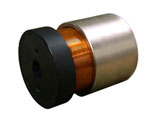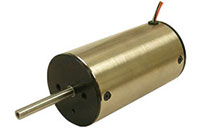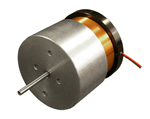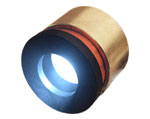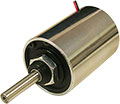Linear Motors -- Linear Motors with Internal Bearing -- Hollow Core Linear Motors
Linear DC Motors, Voice Coil Motors (VCM) or Voice Coil Actuators (VCA) are the simplest type of electric motors. These motors consist of two separate parts; the magnetic housing and the coil.
Applying a voltage across the terminals of the motor causes the motor to move to one direction. Reversing the polarity of the applied voltage will move the motor to the opposite direction. The generated force is proportional to the current that flows through the motor coil. This force is almost constant in the specified stroke range of the motor.
Voice coil motors do not need commutation and using a position sensor, positioning accuracies of less than one micron or 0.00004 inches are achievable.
Linear Voice Coil Motors Linear DC Motors, Voice Coil Motors (VCM) or Voice Coil Actuators (VCA) are the simplest type of electric motors. These motors consist of two separate parts; the magnetic housing and the coil. This type of motor is supplied without internal linear bearings and shaft. A customer supplied linear bearing is required to support the moving coil. |
|
Direct Drive Linear Motors with Built-in Encoder These direct drive linear motors are supplied with an internal shaft supported by long life linear bearings and an integrated position sensor, eliminating backlash and extra space needed for an external feedback device. |
|
Linear Voice Coil Motors with Internal Bearing Linear DC Motors, Voice Coil Motors (VCM) or Voice Coil Actuators (VCA) are the simplest type of electric motors. These motors consist of two separate parts; the magnetic housing and the coil. This type of motor is supplied with internal linear bearings and shaft. |
|
Hollow Core Linear Voice Coil Motors These motors, having a large axial hole throughout the entire coil and body structure are ideal for optical focusing, scanning and other precision positioning applications. This type of motor is supplied without internal linear bearings and shaft. A customer supplied linear bearing is required to support the moving coil. |
|
Direct Drive Linear Motors These linear motors are supplied with an internal shaft supported by two linear bearings. Applying a voltage across the terminals of the motor causes the motor to move to one direction. Reversing the polarity of the applied voltage will move the motor to the opposite direction. The generated force is proportional to the current that flows through the motor coil. This force is almost constant in the specified stroke range of the motor. |















